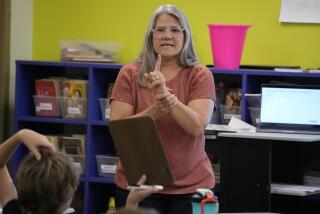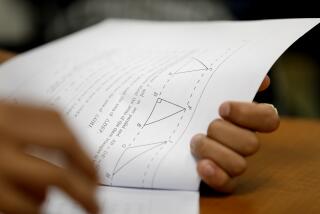Article on Music Was Misleading
- Share via
Studying music is proven to help second-grade children achieve higher mathematics scores (“Keys to Success,” March 15). Should we assume that even greater benefits will be achieved by having 2-year-olds study music?
While there is no evidence to support this theory, your article made this assumption.
The UC Irvine study referred to 135 second-grade students who received four months of piano keyboard training and scored 27% higher on proportional math and fractions tests than other students in the study.
This shouldn’t be surprising to anyone who has followed the ongoing research of Frances Rauscher and Gordon Shaw at UCI, demonstrating that music lessons, and even simply listening to music, can enhance spatial reasoning performance, a critical higher-brain function necessary to perform complex tasks including math.
Furthermore, college-bound seniors with course work or experience in music performance scored 52 points higher on the verbal portion and three points higher on the math portion of the SAT than students with no course work or experience in the arts.
The unfortunate conclusion that starting formal music training with toddlers was somehow linked to these benefits to children is misleading.
Certainly children of all ages can benefit from exposure to music. Children should be encouraged to sing and dance, to enjoy music. This is clearly the best way to develop an affinity for music at any age.
There are potential drawbacks to starting kids too young in formal music study, and questionable benefits. The danger is that instead of making music pure fun for these youngsters, it can become a chore. What a shame to risk burning out a child to the joys of music before they reach school age.
ROBERT ESTRIN
Mission Viejo






